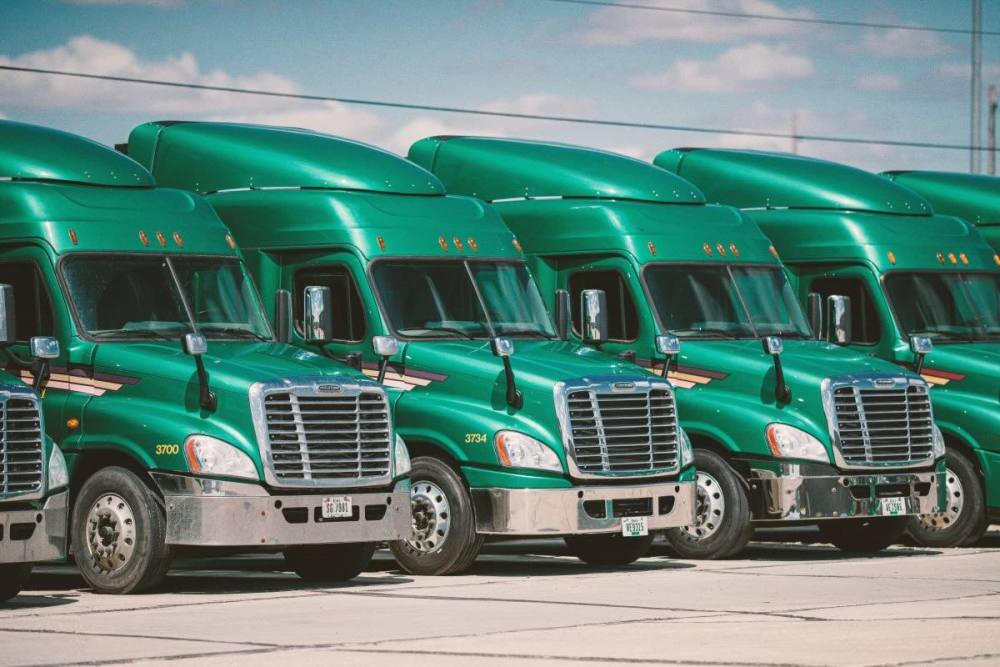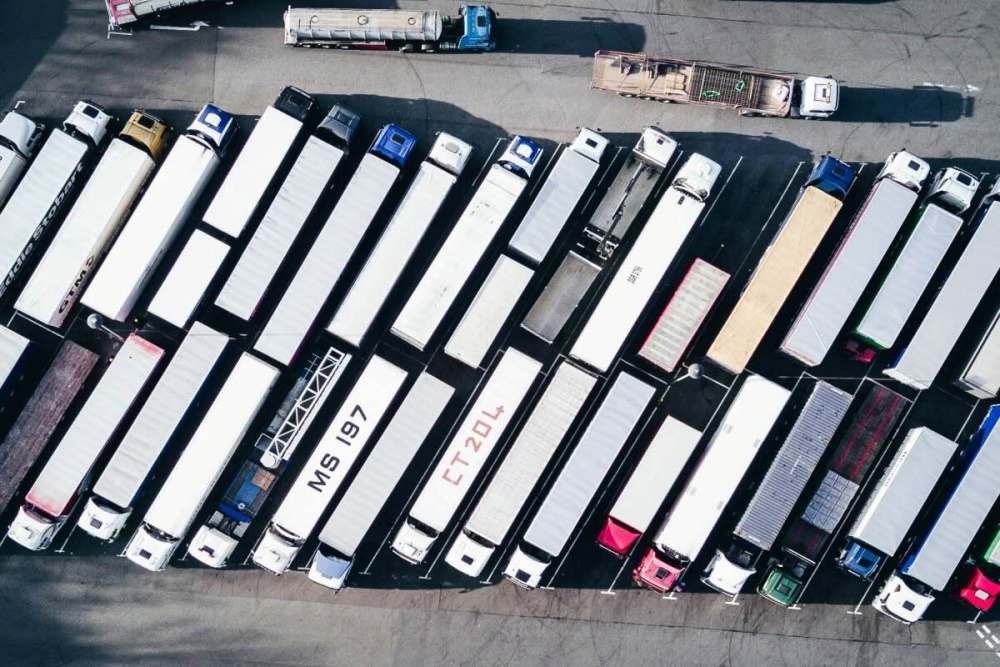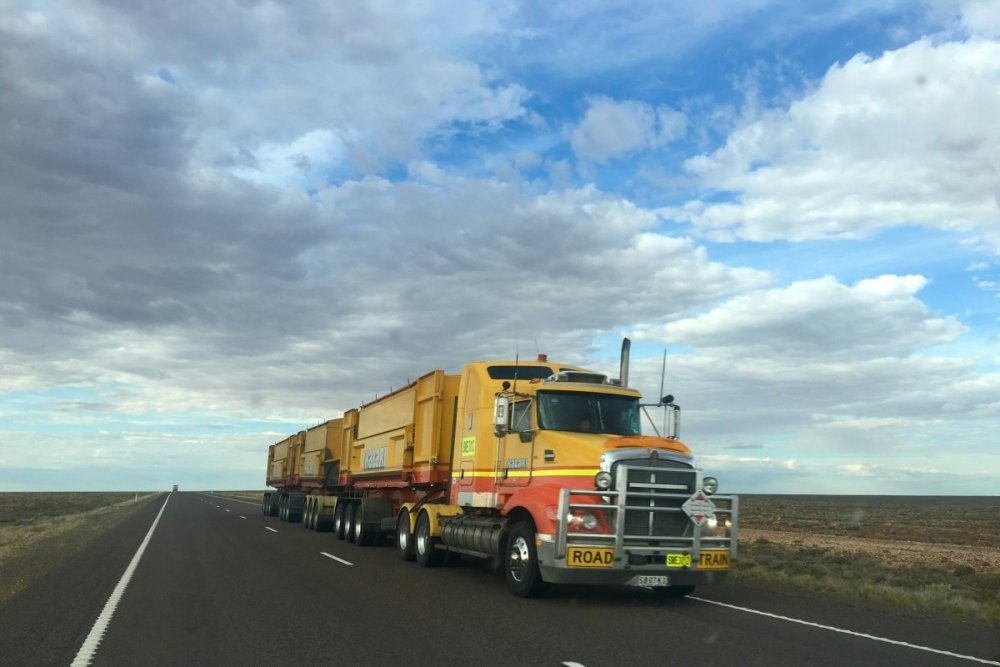If you run a small trucking business (one of the 95.5% of US carriers operating with 10 or fewer trucks), you know how important your commercial vehicle is. It’s not just a tool. It’s your revenue engine.
Financing that vehicle smarter, rather than buying it outright, lets you keep working capital in your business for fuel, repairs, and growth. But what does the process look like in practice?
This commercial vehicle loan guide will take you through everything that matters when pursuing a commercial vehicle loan: from the types of financing and rate factors to eligibility requirements, application steps, and when refinancing makes sense.

What Is a Commercial Vehicle Loan?
A commercial vehicle loan is a type of business financing that helps you purchase, refinance, or lease vehicles used for commercial purposes. That includes semi-trucks, box trucks, tow trucks, food trucks, refrigerated vans, and other specialty vehicles used to generate revenue or deliver business services.
Designed for small business owners, independent drivers, and fleet operators, these loans cover new and used vehicles from dealerships or private sellers.
Unlike personal loans or credit cards, commercial truck loans are explicitly structured for business needs. That means longer loan terms, potentially lower interest rates, and eligibility factors that consider your company’s credit history, cash flow, and registration status.
These loans are available to a wide range of borrowers, including first-time buyers and those with bad credit. Depending on your qualifications and the lender, you can finance vehicles with little money down and flexible terms tailored to your business model.
Types of Commercial Vehicle Loans
There are several financing options available, and choosing the right one depends on your business goals, credit profile, and whether you’re acquiring or replacing a vehicle.
Secured Loans
Most commercial truck loans are secured by the vehicle itself. That means the truck serves as collateral: if you default, the lender can repossess it.
Because an asset backs the loan, lenders are often more willing to approve applicants with limited credit history or lower personal credit scores. In some cases, down payment requirements may be lower, especially if you’re working with direct lenders who specialize in trucking loans.

Leases vs. Loans
Leasing a vehicle is another option, especially if you want to upgrade regularly or avoid ownership hassles. A lease typically comes with lower monthly payments and mileage limits.
However, you won’t own the vehicle at the end of the term unless you choose a lease-to-own option. By contrast, a commercial loan gives you full ownership once the loan is paid off, which builds equity and supports your long-term business growth.
Refinancing Options
If you’re already financing a vehicle but struggling with high interest rates or monthly payments, refinancing can help. A refinance on a commercial vehicle loan allows you to restructure the debt, often with better terms or extended loan lengths.
This option is useful if your credit score has improved, your business finances have stabilized, or you’re looking to free up equity to keep your business rolling.
Pros and Cons of Commercial Vehicle Loans
Commercial truck loans are a powerful tool for small fleet owners, but they come with both benefits and risks. Here’s what to weigh before applying.
Pros
- Preserves cash flow: Instead of depleting your savings, you can keep your cash available for fuel, payroll, and unexpected expenses. That’s critical for small business owners managing tight margins.
- Builds business credit: Making consistent payments on a commercial loan helps establish or strengthen your business credit profile. This boosts your eligibility for future business loans, equipment loans, and credit cards.
- Tax Deductions: In many cases, the interest paid and vehicle depreciation may qualify as tax-deductible business expenses. Check with a registered tax professional to confirm what applies to your situation.
- Flexible Terms: Many lenders offer repayment options that accommodate different loan terms, mileage limits, and seasonal cash flow cycles.
- Access to Specialty Vehicles: Need a refrigerated box truck, food truck, or other specialty vehicle? Financing opens the door to these costly, business-critical purchases without requiring a large upfront payment.

Cons
- Depreciation: Commercial vehicles lose value quickly. While you’re paying off your loan, the asset itself may be worth less than your remaining balance.
- Interest Costs: Depending on your credit score and the lender, you may face high interest rates, especially if you’re working with bad credit or minimal business history.
- Potential Repossession: If you miss payments, the lender can repossess the vehicle. This disrupts your operations and damages both your business credit and personal credit score.
- Usage Restrictions: Some lenders place restrictions on vehicle use, modifications, or resale, especially with lease or lease-to-own agreements.
How Commercial Vehicle Loan Rates Are Determined
Lenders set vehicle loan rates by balancing borrower reliability, collateral value, and market risk. At the core, your credit score (both personal and business) signals your creditworthiness: a strong track record typically unlocks lower interest rates and more flexible down payment and loan terms.
A favorable loan‑to‑value (LTV) ratio, achieved through a larger down payment, reduces lender risk and can result in better financing options.
Next, the vehicle’s age and type matter: newer or widely resalable trucks often qualify for lower rates, while specialty vehicles or high‑mileage rigs may carry higher rates due to higher market and depreciation risks.
The loan term also influences cost dynamics. Shorter terms typically offer better rates but higher monthly payments, whereas longer terms lower monthly obligations yet raise total interest paid. Borrowers must also choose between fixed rates, which offer budget stability, or variable rates, which start lower but can rise with market shifts.
Borrower documentation (financial statements, tax returns, and proof of business operations), along with the lender’s identity (credit union, direct lender, or bank‑guaranteed institution), also factor into pricing.
Current trends set the broader context: for example, as of Q1 2025, average auto loan rates were 6.73% for new vehicles and 11.87% for used cars, providing a useful comparison point to show how broader borrowing trends can shape expectations for vehicle financing.

What You Need to Qualify
To secure commercial vehicle financing, you need to demonstrate both personal and business stability.
Lenders typically require at least one year of consistent business performance, along with a credit score in the 600–650 range for favorable terms; scores below that may still qualify but often carry higher interest rates or demand larger down payments.
Your down payment (usually between 5% and 20% of the purchase price) affects your loan-to-value ratio and could shrink your interest rate. A higher down payment signals lower lender risk.
You also need to provide documentation that proves your business operations, including:
- Vehicle quote with VIN, mileage, and price
- Business financials, including profit and loss statements and cash flow projections
- Bank statements from the last 3–6 months
- Proof of business registration, like LLC documents or EIN confirmation
- Commercial insurance or an insurance pre‑approval
Lenders, including direct lenders, credit unions, or bank‑guaranteed institutions, review your business model and financial statements to assess your credit approval readiness.
Commercial Vehicle Loan Guide: Step-by-Step Application Process
Understanding the commercial loan process helps you move faster and improves your odds of success. Here’s what to expect.
1. Pre-Qualification
Start by prequalifying with a lender that offers soft credit pull options. This allows you to get a sense of available loan terms, payment requirements, and financing options without affecting your credit score.
At this stage, you may need to share your estimated revenue, business equipment needs, and vehicle preferences.
2. Auto Loan Rate Quotes
Once pre-qualified, lenders provide loan quotes based on your business credit, credit history, and vehicle specifications. These quotes outline your estimated annual percentage rate (APR), down payment requirements, and monthly payments.
Compare multiple lenders, including credit unions, FDIC-insured institutions, and online financing platforms, to find the best fit.

3. Formal Business Financing Application
Submit a complete loan application along with your business financials, bank statements, credit report authorization, and personal tax returns. The lender will conduct a hard credit check and verify your income, business registration, and creditworthiness.
4. Business Vehicle Evaluation
If you’ve selected a truck or specialty vehicle, the lender will review the invoice, condition report, and mileage. Some may require an inspection, particularly for lease vehicles or high-mileage used units.
If you’re purchasing food trucks or other specialty vehicles, ensure the specs match your business needs and lender criteria.
5. Final Commercial Loan Approval and Closing
Once approved, you’ll review the loan agreement, finalize your financing terms, and sign the paperwork. Funds are typically disbursed directly to the dealership or seller.
The closing process may take anywhere from 24 hours to a few business days, depending on the lender and whether you’re buying new or used vehicles.
Refinancing a Commercial Truck
Refinancing lets you replace your current vehicle loan with one that better fits your business needs. It can lower your interest rate, reduce monthly payments, or free up equity for growth.
This is especially useful if your credit score or business credit has improved since the original loan, or if you’re managing tighter cash flow.
Many small business owners also use refinancing to consolidate multiple vehicle or equipment loans into one streamlined payment.
You might qualify for better terms if your truck still holds value and your business shows strong revenue and repayment history. Lenders reassess your credit history, vehicle condition, and financial standing.
They typically request a recent credit report, updated financial statements, and proof of business operations, including vehicle use and business registration. Your business model, the age of the vehicle, and the duration of your current loan, typically a minimum of six months, are all considered.
Having an excellent borrower credit history, reliable cash flow, and responsible use of business credit cards can improve your eligibility. Lenders often favor established businesses, but some direct lenders also consider startups or first-time buyers.
While refinancing can ease financial strain or unlock capital, you’ll still need to meet standard credit approval requirements.

FAQs
What is the Typical Loan Term for a Commercial Truck?
Loan terms generally range from 24 to 72 months. Shorter terms lead to lower interest costs, while longer terms result in more manageable monthly payments. Your term depends on the vehicle’s age, your credit score, and the lender’s policy.
Can I Get Financing for a Used Vehicle?
Yes. Many lenders, including direct lenders and credit unions, offer financing options for both new and used vehicles. Used commercial trucks are often more affordable upfront but may come with higher interest rates or mileage-based restrictions.
Is a Personal Guarantee Required?
In many cases, yes. This is especially beneficial for first-time buyers or small business owners with limited business credit history. A personal guarantee ties your personal credit to the loan and may increase your odds of approval.
What’s the Difference Between Commercial Loans and Business Equipment Financing?
A commercial truck loan is specifically for vehicles used in business operations. Business equipment financing covers other assets like trailers, loading machinery, or repair tools. While both require similar documentation, lenders categorize these loans differently for underwriting and risk analysis.
Conclusion
Securing a commercial loan is one of the most important decisions you’ll make as a trucking business owner. The right financing keeps your fleet moving, preserves your working capital, and positions your business for long-term growth.
At Mission Financial Services, we specialize in helping owner-operators and small fleet businesses secure fast, flexible financing, even if you have bad credit or limited business history.
With tailored options, transparent terms, and industry expertise, we make it easier to finance commercial trucks and keep your business rolling. Get in touch today.


